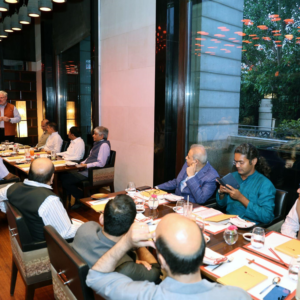~By Guru Prakash and Raghav Pandey
Needless to say the controversy in JNU incited the essential law student inside us to do some research and come out with a comprehensive article on the Law of Sedition in India. The present discourse on the issue is unfortunately dominated by parochial groups and the race is to prove that my idea is better than yours.
According to the Oxford Dictionary of Law, sedition is:
The speaking or writing of words that is likely to incite ordinary people to public disorder or insurrection. Sedition is a common-law offence (known as seditious libel if the words are written) if it is committed with the intention of (1) arousing hatred, contempt, or disaffection against the sovereign or her successors (but not the monarchy as such), the government of the UK, or either House of Parliament or the administration of justice; (2) encouraging any change of the law by unlawful means; or (3) raising discontent among Her Majesty’s subjects or promoting ill-will and hostility between different classes of subjects. There must be an intention to achieve these consequences by violence and disorder. An agreement to carry out an act to further any of these intentions is a criminal conspiracy or the speaking or writing of words that are likely to incite ordinary people to public disorder or insurrection.
The above stated definition clearly outlines the nature of the offence.
‘LAW OF SEDITION’ IN INDIA
The British first introduced the provision relating to sedition into the Indian legal system. The establishment of the East India Company in India led to them bringing in their own laws for the sake of convenience. Gradually, English law was brought into the English settlements in India. This system started affecting the life and liberty of the people in India as these laws considered to be ‘foreign’ and ‘alien’ were interfering with the personal lives of the people, which was not really accepted. Although the extent to which the English law applied in India could not be definitely ascertained, the Presidency towns were subjected to the stringent restrictions of the early English law and did not have the benefit of the later statutory and judicial liberalization in England. Over time, there were many uprisings including mass movements against the British rule in India. A need was felt to enact a law that would act as deterrence for the people trying to revolt.
Eventually, a Bill was drafted on the lines of Section 113 of the Draft Penal Code. It was piloted by Stephen, the legendary criminal law jurist, and was passed as section 124-A of the Penal Code as a part of the Act XXVII of 1870.
Section 124-A was re-enacted by the Act of IV of 1898. It read as follows:
“Whoever by words, either spoken or written, or by signs or visible representations or otherwise, brings or attempts to bring into hatred or contempt, or excited or attempts to excite disaffection towards the Government established by law in India shall be punished with transportation for life or any shorter term to which fine may be added, or with imprisonment which may extend to three years, to which fine may be added, or with fine.”
Explanation 1: The expression “disaffection’ includes disloyalty and all feelings of enmity.
Explanation 2: Comments expressing disapprobation of the measures of the Government with a view to obtain their alteration by lawful means without exciting or attempting to excite hatred, contempt or disaffection, do not constitute an offence under this section.”
The Slippery Slope: Law of Sedition & Freedom of Speech and Expression
The Individual versus State Debate
On achieving independence, India adopted its own Constitution, which guarantees to all its citizens the ‘freedom of speech and expression’ under Article 19(1) (a). All citizens under this fundamental right are guaranteed the right to express their convictions and opinions freely. A democratic form of government attaches a lot of importance to the freedom of speech and expression as it lays the foundations to a truly democratic form of governance. The freedom of speech and expression ensures a healthy participation of the citizens in the governance of the country.[i]
At the same time, Article 19(2) imposes ‘reasonable restrictions’ on the freedom of speech and expression. The perpetual problem it seems to raise is that of striking a balance between individual freedom of expression and the security of the State. Thus, the freedom of speech and expression are not absolute in nature. The collective interests or the interests of the State have been given more importance than the individual’s freedom of speech and expression. But the imposition of restrictions does not mean that the right to speech and that of expressing oneself are restricted always. Whatever restrictions are imposed should not be unreasonable and arbitrary in nature.
While discussing sedition and the freedom of speech and expression, it can be said that sedition under section 124-A does impose certain restrictions on this fundamental right of the citizens, even though it has not been made a part of the ‘reasonable restrictions’ under Article 124-A. Such words or expressions that are capable of causing hatred in the minds of the people against the government should be avoided. The State too has to have certain provisions in its hands to prevent any person from causing hindrance to the peaceful working of the State machinery, which is something that is wished by all the citizens. Thus, in certain cases the individual rights have to give way to the State, which is working for the welfare of the citizens as a whole.
Some Initial Experiences
There came up two cases, which challenged section 124-A on the ground that it violated the freedom of speech and expression.
In Romesh Thapar v. State of Madras[ii], the validity of section 9 (I-A) of the Madras Maintenance Public Order Act, 1949, which empowered the Madras government to impose restrictions on the circulation of a publication in the interests of public safety and the maintenance of public order was in question. The majority of the Court declared that the provision of the Madras Maintenance Public Order Act, 1949 that imposed restrictions on the fundamental right of freedom of speech, to be in excess of Article 19 (2) and was thus held void and unconstitutional.
In Brij Bhushan v. State of Delhi[iii], section 7 (1) (c) of the East Punjab Public Safety Act, 1949, which authorized the imposition of restrictions on the freedom of speech and expression for preventing or combating any activity prejudicial to the public safety or the maintenance of public order. The Court held the provision to be in excess of Article 19 (2).
In the aforementioned two cases, Justice Fazal Ali gave his dissent. Augmenting difficulties about the use of the word ‘sedition’, he said that the framers of the Constitution must have found themselves face to face with the dilemma as to whether the word ‘sedition’ should be used in Article 19(2) or not and if at all it was to be used, in what sense it was to be used. He referred to the probabilities that on one hand the framers must have been possessed with the view that sedition was essentially an offence against public tranquillity and on the other hand with the pronouncement of the judicial committee that sedition as defined under the Indian Penal Code did not necessarily imply any intention or tendency to incite disorder. Thus, finally the framers decided to drop the word ‘sedition’.
Some Recent Experiences
- Cases of Arundhati Roy and Syed Ali Shah Geeelani
A conference on the “Kashmir deadlock” in New Delhi was held titled “Azadi: the Only Way” in October. It was organized by a Committee for the release of political prisoners. The conference was supported and attended by Naxal organizations and some rights activists and journalists. The prominent figures among the participants and speakers were: Chairman, Hurriyat Conference Syed Ali Shah Geelani, Writer and Social activist Arundhati Roy, Prof. S A R Geelani, Dr Aparna, CPI-ML- New Democracy, Revolutionary poet Varvara Rao and Sujata Bhadra among others. A case of sedition was been filed in a local court against noted writer Arundhati Roy for her controversial remarks on Kashmir. The complaint was lodged by one Ashish Kumar Singh. A Delhi court ordered registration of FIR against hard-line Hurriyat leader Syed Ali Shah Geelani, writer Arundhati Roy and five others for allegedly making anti-India speeches.
JNU, SEDITION AND FREEDOM OF SPEECH AND EXPRESSION
Earlier this year, a group of students held protests in the JNU campus who inter alia demanded independence of Kashmir from the Indian state. Among many slogans used in the protests, some slogans called for the dismemberment of the Indian state into pieces. This incident became the genesis of the present debate on the law of sedition, when the students who indulged into the protests were booked under Section 124-A of the Indian Penal Code.
The courts on various occasions have registered strict objections to the unhindered use of freedom of speech and expression. Any law or a conceptual sanction needs to evolve with changing time and circumstances. Freedom of expression has had a long tryst with reasonable restrictions that accompanies it in the Constitution of India. The authors are of the opinion that the observations of judiciary on the interface of sedition and freedom of speech and expression reflect pragmatism and evolving dynamics of our society. The belligerent sloganeering at the JNU campus clearly amounted to an act potentially causing disruption, disrespect and disaffection to the idea of India as a nation. In our humble opinion, no one institution or individual can legitimately claim to represent the idea of India. India is a land of diversity and there will be diverse perspectives on the idea of nationhood. The uprising in JNU is plagued by the idea of exclusivism and an element of intolerance towards different viewpoints has corrupted the institutional discourse to the core.
Hence, it can be averred here that the form and purport of the law of sedition in which the British enacted the law has definitely changed. The law at the time of enactment prohibited the criticism of government, which certainly is now an integral part of the democratic process. If we examine the recent judgements on the law of sedition it can be seen that the courts only uphold those prosecutions where the accused has acted in contempt of the Indian state and not the government alone. This stand is definitely in harmony with our Constitutional values and established norms of democracy.
(Guru Prakash is a Senior Research Fellow & Project Head at India Foundation and Raghav Pandey is a Research Scholar at School of Humanities, IIT, Mumba.)
[i] V.N. Shukla, Constitution of India, 105 (Eastern Book Company, Allahabad, 10th edn., 2006)
[ii] AIR 1950 SC 124
[iii] AIR 1950 SC 129



